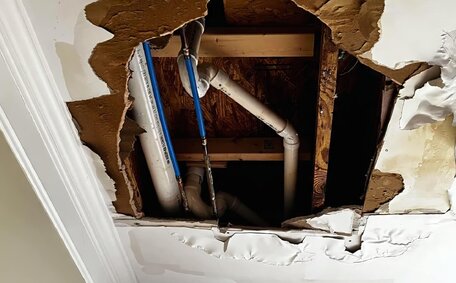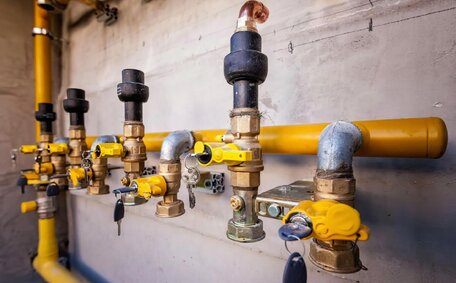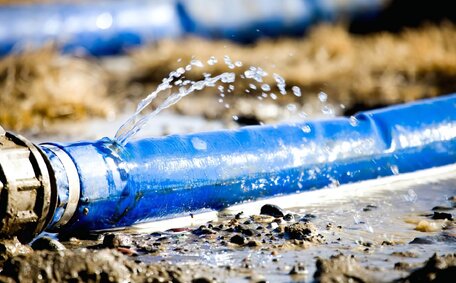Introduction to Blocked Drains: Causes and Prevention
Blocked drains are a common issue that can cause major headaches for homeowners and tenants alike. They often occur when debris, like food scraps, hair, or tree roots, build up in pipes over time. This blocks the flow of wastewater and sewage, leading to backups and overflows.
As a plumbing company serving Lindfield and the greater Sydney area, we frequently help homeowners address blocked drain problems. While tenants are not usually responsible for maintaining sewer lines, it’s important to understand what causes clogs so you can help prevent them.
Grease and oil are common culprits. Tree roots can also invade and crack pipes seeking water.
Allowing fats, oils, and grease to wash down drain in the kitchen sink can cause thick buildup on pipe walls over time. And sometimes, kids flush toys or wipe flushable wipes that get stuck and cause issues.
Whatever the cause, we recommend tenants stay vigilant to avoid blockages. Never pour grease or harsh chemicals down drains. Whatever the cause, we recommend tenants stay vigilant to avoid blockages. Whatever the cause, we recommend tenants stay vigilant to avoid blockages.
Call us if you notice gurgling sounds, smelly odours, or slow drainage, as these can indicate a growing clog.
Delineating Maintenance Duties: Landlord vs. Tenant
In Lindfield, the landlord responsible for maintaining and repairing issues within a rental property. This includes blocked drains that have been caused by problems with the property’s plumbing system or pipes.
According to NSW tenancy laws, landlords are responsible maintaining plumbing and appliances in functional condition, ensuring pipes and drains are clear, and repairing issues like leaks or burst pipes. Clearing blockages falls under the landlord’s responsibility unless it was proven to be the tenant’s fault.
However, tenants have a duty of care to avoid negligent damage, notify the agent or landlord of problems, and keep fixtures reasonably clean. Intentionally or carelessly pouring fat or harsh chemicals down drains could make the tenant liable for repairs.
In units or apartment buildings, landlords and strata are often responsible for common piping while tenants maintain drains inside the individual unit. But the delineation of duties can vary.
It’s important tenants review their lease and contact their landlord, strata manager or our Lindfield plumbing experts if they encounter a blocked drain. We’re here to help tenants and landlords diagnose issues and carry out any necessary repairs.
When Is a Blocked Drain Considered an Emergency Repair?
A blocked drain is usually considered an emergency issue when it causes a total loss of wastewater drainage in the rental unit. This includes clogged or backed up toilets, sinks that won’t drain, bathtub backups, or foul sewage odours.
Blocked drains that prevent proper toilet functioning are especially urgent, as tenants may be left without use of bathroom facilities. Likewise, extensive flooding from tub or sink backups can cause rapid property damage, making fixing blocked systems crucial.
In emergency cases like these, Lindfield landlords and property managers should arrange drain clearing repairs or roto-rooter services as soon as possible – whether during business hours or after. Tenants should notify their property manager straight away if facing a total loss of proper drainage or plumbing functionality.
While partial or gradual drain clogs do happen, tenants should never have to cope long-term with unusable fixtures or backups resulting from landlord neglect. Contact our Lindfield plumbing team if your urgent blocked drain issues persist without a proper response.
Scenarios Where Tenant Negligence Causes a Blockage
While landlords hold responsibility for maintaining plumbing systems, there are cases where a blocked drain is clearly the negligent fault of the tenant.
Tenants may be liable if they:
- Pour fats, oils, or grease down the kitchen sink instead of disposing properly
- Flush non-degradable items like wipes, feminine products, disposable diapers, cotton balls, or plastic
- Allow toys, cutlery, tools, or other foreign objects to fall down drains
- Fail to use drain screens, catchers, and strainers to trap debris
If the tenant’s actions directly caused a costly blockage, they may be held responsible for paying any repair or cleaning bills instead of the landlord or strata company.
To avoid disputes, landlords and property managers should thoroughly document any tenant-related drain incidents with photos, written statements, video evidence, and plumber’s assessments of the debris removed. Open communication is likewise key.
Tenants should always alert their property manager if something unintended goes down the drain so issues can be addressed promptly by experts. Our Lindfield plumbing team helps resolve liability questions and prevent tenant clogs from becoming bigger problems.
Can a Landlord Charge for Drain Repairs?
In most cases, Sydney landlords are responsible for paying for drain repairs and maintenance issues that arise during a tenancy. However, there are some specific situations where they may pass charges for repairs onto the tenant.
According to NSW Fair Trading rental laws, tenants can be held liable for non-urgent repairs caused by their negligence, intentional damage, or failure to take reasonable care of the property. For the landlord to claim repair costs though, they need evidence proving the tenant directly caused the issue.
If a blockage clearly originated from tenant misuse like pouring fat down sinks or flushing baby wipes, the landlord may justifiably ask the tenant to pay. Though for tenant liability to apply, the landlord must show they took preventative measures too, like installing drain screens.
Tenants who dispute any charges can contact Fair Trading or our Lindfield plumbing experts to assess whether the damage claim is reasonable. We help mediate any disputes, acting as a mediator between landlord tenant conflicts regarding who pays for drain clearing or repairs.
While tenants should try to avoid negligent clogs, landlords equally have a duty to address maintenance issues promptly, only passing on costs in clear-cut cases with documentation. If tenants are ever unsure of their rights and responsibilities regarding plumbing repairs, we’re here to offer transparent, professional help.
Navigating Shared Drainage on Rental Properties
Shared drainage systems are common in units, townhouses, apartment buildings, and other multi-tenant rental properties. When a blockage occurs, determining responsibility can get complicated.
In properties with common drainage pipes, property owners and strata managers generally handle exterior sewer lines while tenants maintain in-unit plumbing fixtures and drains. But the delineation varies. Sydney Water also services shared main lines.
If a clog stems from the internal plumbing of one rental unit, such as a tenant pouring grease down a kitchen sink, the tenant may bear responsibility. But if tree roots invade exterior pipes or a child flushes a toy down a toilet, affecting the whole building’s drainage, that usually falls to the landlord or owners corporation to repair.
Per City of Sydney plumbing regulations, multi-unit landlords must ensure proper ventilation prevents odours and gases from entering rental units, even from shared waste pipes. So if sewage backups through drains or toilets emit foul smells in a unit, the landlord needs to properly investigate and fix such hazardous issues.
In Lindfield and across Sydney, the complex networks of ageing drainage pipes underlying units can make pinpointing a specific blocked drain location difficult. Our professional Lindfield plumbing team helps multi-tenant landlords and renters determine fault, ensuring fair accountability and prompt clearance of clogs impacting shared lines.
Preventing Blockages: Tips for Landlords and Tenants
Blocked drains can be inconvenient at best and cause serious property damage at worst. By taking preventative measures, both landlords and tenants can help avoid costly plumbing issues.
Tips for landlords:
- Install drain screens over sinks and tub drains to catch hair and debris
- Consider professional drain cleaning every year or two to clear any buildup
- Ensure tree roots and plants don’t invade exterior drainage pipes
- Seal pipe cracks that could allow root growth
- Discourage tenants from putting grease or harsh chemicals down drains
- Document any tenant-related drain incidents
Tips for tenants:
- Use sink strainers and tub drain catchers religiously
- Never pour fats, oils, or grease down the drain
- Avoid flushing anything except toilet paper
- Take care not to drop objects down bathroom or kitchen sinks
- Notify your landlord’s representative about any strange smells or slow drainage
By staying vigilant and tackling any drainage issues promptly, landlords and tenants can prevent minor clogs from becoming huge headaches. If problems do occur, contact our Lindfield team for the region’s most trusted plumbing services focused on drain clearing.
Resolving Drain Issues: Next Steps for Tenants
If you discover a blocked drain as a tenant, stay calm and take proactive steps to get the issue resolved promptly. Here is what to do:
- Notify your property manager or landlord immediately. Provide as much helpful detail as possible, like where the clog seems worst or any strange gurgling noises you’ve noticed.
- Document the issue thoroughly. Take photos and videos showing any backups or slow drainage, record dates/times, and save copies of all communication with your landlord regarding the problem.
- If your property manager does not respond quickly or delays addressing emergency clogs impacting toilet use, contact our team at Lindfield Plumbing on 1300 349 338. As drain specialists serving the Lindfield area for over 10 years, we’re ready to help 24/7.
- Avoid using harsh drain cleaners or trying to clear clogs yourself by disassembling pipes. This risks further damage. In older buildings especially, invasive roots growing into pipes require professional hydrojetting, roto-rooter augers, or drain camera inspections to pinpoint underlying issues.
- Ask your property manager to have our Lindfield technicians assess the drain and determine if tenant negligence played any role. We provide transparent blocked drain diagnoses and pipe condition reports to help resolve liability disputes fairly.
- Reach out to our Lindfield plumbing team if your landlord fails to fix a persistent drainage problem in reasonable time. We’ll advise whether further action like contacting NSW Fair Trading is warranted based on your specific situation.
By following these steps as soon as you notice gurgling or backup warning signs, tenants can get ahead of minor clogs before major headaches occur.
We specialise in solving tricky drainage issues in Lindfield rentals where responsibility questions often arise between property stakeholders. Contact Lindfield Plumbing on 1300 349 338 or [email protected] for professional drain assessments and repairs tenants can count on.






